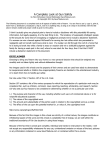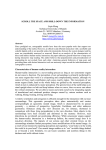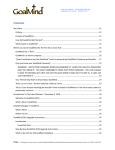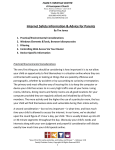Download Notes
Transcript
God Overcomes—Romans 7:12-13—1/17/2010 Copyright by Mark Vaughan 1/2010 Keywords—law, grace, cultural issues, sin, hope As I approached writing today’s sermon, I felt overwhelmed by the many and various topics that I wanted to touch on today. In preaching Romans 7:7-13, I had too much to say in December and had planned to finish our study of this text on the Sunday we were snowed out under a record snowfall. So I expect that we both need a refresher on the context of Romans 7. I am also challenged today by a desire to encourage you to pray as we begin a New Year and host a ladies’ prayer retreat this Saturday and a men’s prayer retreat the following Saturday. On another issue, today celebrates the beginning of Sanctity of Human Life week and I want encourage ministry in that area. I want to lift up adoption this year as a valuable pro-life ministry that can illustrate the sacrificial love of God in adopting us into His spiritual family. I want to encourage you in displaying God’s love through Gospelmotivated ministry to those in need in pregnancy or nearing death. Also in connection with this weekend, I wanted to recognize that we have a long way to go in healing from past sins that separated people with different skin tones. Sunday is still a very segregated day in Roanoke and that lack of unity among true Christians does not display the power of the Gospel. As Dr. Martin Luther King Jr. is remembered tomorrow, we as Christians should reflect on what we might sacrifice to display Christ’s glory in unifying His people under His Gospel. And finally, after the earthquake in Haiti this week, I also wanted to comment on God’s sovereign goodness and comfort in tragedy. When I list those various topics and the task of reconnecting us with our sequential study through Paul’s letter to the Romans, maybe you can understand my struggle this week. Since many of you gathered for a two-hour movie here Friday evening, I figured I’d preach for a little less than 4 hours today and that would allow a 45-50 minute sermon on each of these topics. Just joking. I’ll try to finish in less than that. Normally I’m not a hot-topic, social-issue preacher, but I do want us to be aware of timely opportunities for Gospel ministry and we need regular reminders on some issues like prayer. And if we read what Jesus said and what His prophets said before Him, we can’t deny that He cares about suffering and human life and love among His people. So as I meditated on tying these issues to our return to Romans 7, it occurred to me that there is a common theme we can weave together. Think with me about the repugnant lies that sin tells in the various situations I’ve mentioned. In a tragedy like an earthquake, even though the greater power of God must be admitted, sin seeps out slimy lies that say that God can’t be good if He allows such suffering. Sin takes a chance to bow the knee in fear of God and turns it into a chance to shake a fist to fight against God. And similarly, when a tragedy happens or a person nears death or a baby is conceived in an unplanned way, sin seeps out slimy lies that say it’s ok to end life in such circumstances. 1 Sin turns the precious gift of life into an expendable burden. As well, though the problems of ethnic injustice in America present a wonderful opportunity for repentance and forgiveness and healing and love, sin seeps out other slimy lies. Sin says that hate is better than hope because then you won’t be let down if your hopes fail. Sin says separation is better because it’s easier to love our cultural comforts than to love Christians with different backgrounds. And in the midst of all such issues, sin constantly seeps out slimy lies that say God doesn’t care enough about such things for us to really pray to Him about them. Sin says that God is not interested or He’s too distant or uncaring or that the problems are too big to bother praying about. Or sin says that entertainment and safety and financial security are more important. Whether through our flesh or the world or the devil, sin can can seep out slimy lies to poison any situation. Kids—I want you to be eager to fight against selfishness and disobedience and disrespect in your attitudes, words, and actions. I want all of us to take seriously our need to fight the sins we easily excuse and the fight the lazy apathy we also excuse. I want us—me especially—to awake from the complacency that often plagues us to see actively engage in internal and global spiritual war to display the glory of God through Jesus Christ. That must be done with the Gospel as the central motive and motif, but it can be done in all the areas I’ve mentioned today. And how we display Christ to others is a theme I’ve been meditating upon a lot lately that is helping me and I pray will help you. Considering what kind of Jesus and what kind of God and Gospel we display can give clarity to a lot of decisions. We should be concerned to display the love and goodness and wisdom and justice and joy and power of our God and His salvation. Those are God’s concerns in what He does and we should make them our concerns. Sin can dash hope, drain joy, and deter love in many ways. Sin is crafty, deceitful and dangerous and that reality is a common thread in the variety of issues I felt the need to mention today. So one of the things I prayed for you and me this week is that we would be serious and zealous about fighting sin. And we see these concerns of God even in how He uses His law as we return to our study of Romans today. The way God uses His law in Romans 7:12-13 can give us hope and direction in how we respond to issues like those I’ve mentioned and to all that we face in life. I want us to be alert to the intense spiritual battle within us and around us all the time so that we will not easily cave in or be led astray. It’s intriguing and amazing to study what God does with His law since we’re more accustomed to treasuring what God does with His Gospel. I want each of us at every age and stage to be actively fighting sin in our own hearts and in helping others. Often in Romans, we’ve seen the moral law of God contrasted with the salvation of God by His grace through faith. 2 Romans 3:20 stated that “by the works of the law, no flesh will be justified in [God’s] sight.” Romans 3:21 continued the contrast by stating that “apart from the law, the righteousness of God has been manifested.” So Romans 3:28 summarized that “a man is justified by faith apart from works of the law.” Paul made clear that the law cannot save a soul, cannot get a single one of us justified–or declared right—before God. As we wade our way back into the deep waters of Romans 7, let’s read Romans 7:7-13 to set our thinking for what we can learn today from verse 12-13—read Romans 7:7-13. [READ] Wrong use of the law raised this question of the law’s value and Paul answered it emphatically. We began considering 6 uses of the law from verses 7-13 and verse 7 told us first that God uses the law to show human sin. Paul notes that he would not have come to know the general sin principle living within him except through the law. Doing good works to measure up to a law will not save us spiritually. And he illustrated that by how the law revealed his coveting. And Romans 4 made clear that God’s promises, not His law, were the way His people were saved even in the OT. So by chapter 6 of Romans, a right relationship with God is described as being under grace as distinct from and opposite of being under law. Romans 7 even begins describing a right relationship with God as being dead to the law and cut off from marriage to the law so we can be spiritually married to Jesus instead. If you recall this flow of thought in Romans, you also recall then the question of Romans 7:7 that arises. That question is whether the law is then sinful. If we have all these contrasts where the law is on the bad side of the deal opposite the Good News of salvation by grace in Christ, then what should we think of the law. Even though the law is God’s revealed moral standards, is the law itself the real problem? Turn to Romans 7:7 with me and let’s read it to recall Paul’s answer. So the law reveals the indwelling presence of sin as a reality warring in us and the law also reveals specific sins like coveting. Yet sin is so crafty, as verse 8 notes, that sin takes God’s good law and uses it as a base of operations to produce more sin. So we noted 2ndly here that sin uses the law to stir up more sin. Then verse 9 reveals 3rdly that God uses the law to show spiritual death, to show that sin flows from spiritual death and leads to eternal death. God uses His law to show the destruction and dangerous end of sin. But sin fights back against God, as verses 10-11 reveal, by seeking to sustain sin and spiritual death, to keep a person in sin headed for the eternal punishment of the lake of fire. So 4thly we said that sin uses the law to sustain sin & spiritual death. Those 4 points highlight the back and forth battle between what God does with the law and what sin tries to do with the law. 3 To review those points from verses 7-11, we saw that (1) God uses the law to show human sin; (2) sin uses the law to stir up more sin; (3) God uses the law to show spiritual death; & (4) sin uses the law to sustain sin & spiritual death. And what Paul proved through those verses mainly is that the law is not sinful as he sums up in verse 12. The law may be used deceitfully and dangerously by sin, but that does not make the law itself sinful. God had good purposes for the law and He uses it for good. So the law is not sinful. Rather, the law is a revelation of God’s beautiful and desirable ways of how His creatures should live life to the fullest. Instead of being sinful, the law is the opposite—it is holy and righteous and good and it is a revelation of God’s character as holy and righteous and good. The whole overall moral law of God is holy and each specific commandment is holy and righteous and good. The commandment here may refer to the 10th commandment against coveting or merely to each commandment on its own. Either way the point is to extol the virtue and value of God’s law. The first description of the law is that it is holy, which means that it is set apart to God, worthy of honor, and morally pure. It is not defiled, mixed, dirty or wrong and it is certainly not sinful. Similarly, the commandment is said to be holy and righteous. The description “righteous” highlights the law as being right, just, fair, guiltless, and upright and trustworthy as a standard. No one can stand before God & say His commands are not fair. And that is true even though He has given a law that is impossible for sinners to live fully on our own. Read verse 12 again to see Paul make that point. [READ] While Paul has emphasized that the law cannot save us, that every person apart from Christ has sinned and broken God’s law, he maintains here that the law is still good in itself. When light shines into darkens and reveals dirty messes all over a room, the light is not the problem—the light did not create the messes. Similarly, when God’s law shines into lives and reveals sin or even is used wrongly by sinners to stir up more sin, the law is not the problem. The law being used to puff up pride or stoke rebellion is a problem of human sin not a problem of the law itself. Some people want to argue that it is not fair for God to set a standard that He knows we will all fail to reach. They may argue against the biblical teaching of total depravity and original sin and say that God must put enough good in everyone for them to obey His law or it would not be fair for Him to judge us. But that is not true—that is not only illogical, but also proud to assume that fallen creatures can tell God how He should be. God is not required to lower His standards in order to be fair. He is our Maker and Ruler—He can do whatever He wants. 4 And above that, He is perfectly good and wise and just and righteous and He is the source of all things good that we experience. Since He is the standard, then He is a better judge of how to determine fairness and how to govern His creatures. And we need to think about using God’s law in that same way. We need to consider how to speak to ourselves and to our kids and to each other and to unbelievers in a way that highlights God’s goodness in the commands He gives. And when He sets His moral laws, they are right and fair and just. Obligation does not imply ability and that’s still fair. Then thirdly in verse 12, the commandment is said to be good, meaning it is useful, pleasant, agreeable, excellent, and helpful. With these descriptions, the law is revealed as desirable and precious in pointing to what’s good and warning against evil. So the law is a gracious revelation from God for the good of people. And in revealing such standards, God also uses the law to reveal His own goodness. Often God’s law and God’s commands are presented in a way that makes them oppressive and undesirable and sour. Following God is bludgeoned over people like drudgery as if God was some cosmic killjoy seeking to squash all fun. But that is not God’s plan for how His law should be presented. God is in charge and so His commands are not negotiable, but He is a good and loving God, a wise and gracious God, who has revealed His lofty standards to display what is good for us. Just think how happy life would be if we were all always rejoicing and thankful! By definition, God is good and His commands and ways are good. And God uses His law to show us both His own goodness and His design of what is good for us. So in contrast to what sin tries to do with God’s law, Paul affirms here the goodness of God and the goodness of God’s law. And life would be wonderful if we all obeyed God and loved Him and loved each other like He says to do all the time. It’s no wonder that the longest Psalm, Psalm 119, is all about the beauty and goodness of God’s moral law. So we can learn here to use God’s law to show His goodness. As a 1st point for today and a 5th point from my overall outline covering verses 7-13, we can summarize verse 12 in context by saying that God uses the law to show His goodness. Verses 7-11 taught that (1) God uses the law to show human sin; (2) sin uses the law to stir up more sin; (3) God uses the law to show spiritual death; & (4) sin uses the law to sustain sin & spiritual death. Verse 12 teaches that God uses the law to show His goodness. Do you train your kids and yourself and others with that kind of winsomeness? Despite sin’s attempts to corrupt the law, when the law is rightly understood and received and applied, it shows God’s goodness. By revealing the good and righteous and holy way to live, the law reveals God’s character as good and righteous and holy. 5 And God always overcomes sin’s attempts to corrupt His law. God always wins—never doubt that—He always overcomes evil with His good and righteous and holy purposes in the end. The overcoming power and plan of God is evident in verse 13 as Paul continues his defense of the law. I think the ESV leaves out the second “so that”, but I think you can find them in other translations. The first purpose is that sin might be shown to be sin by effecting my death through that which is good. Please get this—here’s how bad sin is—sin takes something entirely good and righteous and holy like God’s law and uses it for evil and produces spiritual death as a result. Read verse 13. [READ] Verse 13 raises a question in response to Paul saying the law is good after he’s said the law is used to bring condemning death. If the law is so good and yet it gets used by sin that leads to death, then is the law the cause of spiritual death? This is the classic question of blaming the messenger, of attacking the person who brings bad news as if the messenger is the problem. But here again Paul vehemently rejects the possibility that God’s good law could be a cause of something evil like death. “May it never be!”, you may recall is Paul’s answer of flat denial. Instead, he states clearly & emphatically that the cause was sin. “Rather it was sin!”, verse 13 exclaims and Paul leaves us to finish the thought that sin was the cause of death. For example, sin can take a doctor that is trained to preserve and protect human life and morph him into a skilled murderer of the feeblest human lives at their start or end. Sin can take biblical history of God’s work with Israel and twist it into an excuse for ethnic superiority and separation. Sin can take trust in God’s sovereign power and twist it into a callous, uncaring prayerlessness. And sin can take a tragic time to cry out to God for mercy and mangle into a proud time to deny God’s existence & deny any need for Him. Have you ever had something like that happen to you? Has some attempt at love and kindness gone bad & blown up on you? For example, have you ever tried to lovingly show someone his or her sin by pointing them to God’s good design in His Word and they turn away and go further into rebellion? He points the finger of blame where it belongs—it was SIN! Or worse, have they attacked you or gossiped or slandered you? And then verse 13 finishes with two purposes of God in trumping the work of sin so that God’s purposes finally win out. Find the clauses starting with the word “in order that” or “so that” or “that” in verse 13 and you’ll see it. That’s what sin does with God’s own good commands. If sin can twist and mess up God’s own holy law, then surely sin can twist and mess up our efforts to apply God’s Word to people’s lives. 6 That’s the power and evil of sin. So if and when that happens, it should not surprise us. But it should shock us to show us how terribly evil sin is. And it should teach us to guard against reacting when others have enough faith and love to point out our sins. It should warn us with this first purpose in verse 13—God lets sin corrupt what is good in order that sin is shown to be sin. See God’s purpose—God wants the wickedness & destructiveness & foolishness of sin exposed and manifested and put on display. God wants people to see just how sad & deceitful & entrapping & disappointing & empty it is to rebel against Him. And that gives us our 2nd point today and 6th point overall in this section—that God uses the law to show sin’s evil. Well, here’s the opposite—God also purposes to show the surpassing greatness of the sinfulness of sin, of the wickedness of wicked. God wants sin not merely to be viewed as a little thing, a slipup that is merely not the best. No, verse 13 tell us that God takes the dark, sinister, ugly work of sin and exposes it so that we should shriek at how evil it is. God allows His very user’s manual for humanity to be used by sin as a tool to fight against Him so that He can show sin’s evil. It’s like sin takes God’s book and uses it to warm the fires of hell and God wants us to see how shockingly vile and malicious that is. That’s how bad sin is—and that’s how bad it is even when it raises its ugly head in my life and yours. So I want to encourage you again to find out where sin is showing itself in your life. Point #2 today—God uses the law to show sin’s evil. If you believe that sin really is bad, then try to find it and kill it. Point #1 today was that God uses the law to show His goodness. As I mentioned before, ask others where they see you as sinning. nd And 2 ly today, God uses the law to show sin’s evil. And the second purpose in the last phrase of verse 13 drives this last point home even more deeply. The end of verse 13 states God’s purpose is that through the commandment sin might become utterly sinful. God purposes that through the commandment sin might become sinful in the extreme, or literally, sinful according to surpassing greatness. You know the verses that talk about God’s surpassing greatness and the surpassing greatness of God’s love & grace? What you hear may reveal some misunderstandings and miscommunications, but that is worth knowing too. And more likely, it will reveal to you things about yourself that you may not want to admit or may not like hearing. So be prepared to fight your sinful tendency to react in anger or despair or anxiety or bitterness or self-pity or pride in whatever other sinful manner you may be tempted. Then be eager to consider just how evil and destructive your sin is. 7 Be eager not merely to admit sin or even to help others admit sin, but pray for God to help us consider the real and potential problems our sins cause so that we’ll hate our sin and fight it. When you are confessing sin to others, especially your kids, and when you are helping your kids confess sin to each other, help them consider why sin is bad, why your sins and their sins are bad. Learn here from God to use His law to show sin’s evil. I don’t mean to lecture down to your kids or others. I mean to say, “Think how bad it is when you and I are selfish—when WE are proud—what are WE doing? We are worshipping ourselves and that’s idolatry—how evil!” And no matter the issue, we can show sin’s evil in relation to God and in its effect on other people. Know and believe that God uses His law both to show His goodness and to show sin’s evil and pray for Him to do both in your life. I think we need to ask ourselves how much we care about Christ and the testimony of His work in our world. And I found a quote by Martin Luther King Jr. that was really convicting in light of our need to be more active in the fight. In Atlanta in 1966, Martin Luther King, Jr. said this: “History will have to record that the greatest tragedy of this period of social transition was not the vitriolic words and the violent actions of the bad people, but the appalling silence and indifference of the good people. Our generation will have to repent not only for the words and acts of the children of darkness, but also for the fears and apathy of the children of light.” What do you think of that—what will history record about you in our time period of spiritual and moral decline in America? What will history record about the testimony of Christ and His Gospel and His glory and His church in our lives? What can you do to make a difference for God’s glory? Read God’s Word and see His commands and pray that He will open our eyes to these fruitful uses of His law. Pray that we will be moved to love God and His good ways more and that we will be moved to hate evil and flee from it and fight it. May God move us first to fight our own sin and enjoy His truth personally, but then may He move us beyond ourselves to invest in others. As I mentioned to begin today, I pray God will awaken us from our complacent comfort with what we consider little sins in us and what we consider too big to tackle in others. I pray we will be energized by God’s Spirit because we want Jesus Christ and His Gospel displayed as glorious. If you say that you don’t know what you can do about any of the issues I’ve raised or how you can make a difference, then first pray. Ask God to guide you and to cultivate godly desires in you and ask leaders and others how you might serve. And consider what God can do through you that is beyond your comfort zone and beyond what you think is natural for you. Be serious about fighting your own sin and seeking God. And recall that our text today shows us how God can use His law to show His goodness and show sin’s evil. Let God use you to use His law in that way. 8 Be eager for people to see the goodness of God by sharing with them from Scripture and experience how satisfying and desirable and wise and eternally right God’s ways are. And take the time and discomfort of explaining how utterly sinful sin really is. Be honest and bold because sin really is atrociously wicked and God really is supremely glorious. We can know that whatever bad reaction or evil may come and whatever sin tries to twist and corrupt will not last forever. God will overcome—God always wins and He will overcome the work of sin to accomplish some greater good. Just as sin sought to conquer Jesus Christ and yet Jesus’ death became the center of victory and life, so God always overcomes evil. So only by turning from our sin to faith in Jesus can we begin to view and use the law rightly. The law is not what we trust for our salvation or sanctification. The law is merely a tool that God uses to show us how good He is and how bad our sin is so that we will seek Him for forgiveness and power to change. God does not want us to focus on the law for self-reformation. He wants us to focus on Christ for the Spirit to transform us as we grow in understanding and applying truth to our lives. The motive to respond rightly to the law is always one of faith to God’s grace, of depending on God to give what He commands. It is to approach God as early church father Augustine is quoted as praying, “God, give what you command.” And the certainty of final victory through Christ should always be at the center of our motivation and action. We don’t approach God and His law to proudly accomplish it on our own or to slam down judgment on others. We always need to remember why Paul even had to defend the law in this context in the first place. We share the law with others to lead them to God’s goodness and His gracious offer of the Gospel in Christ. Remember that the law cannot save anyone, that you and I don’t come close to ever measuring up to God’s law either. Remember that the goal of seeing our sin and showing others their sin is to lead us all to the Gospel, to the saving power of God through faith in Jesus Christ again and again. Only Jesus came from heaven to live perfectly under the law and only Jesus died to satisfy the law’s justice on sin. And through Christ, we look at the impossible standards of God and prayerfully seek to obey asking Him to give what He commands, asking Him to empower us to do what He calls us to do. May God make give abundantly what He commands so that we will vigilantly fight sin and passionately love God and others. And as God gives, may He be shown through us as glorious. Pray with me as we close. And only Jesus rose in victory over death to prove He conquered sin. 9























